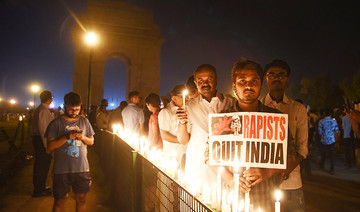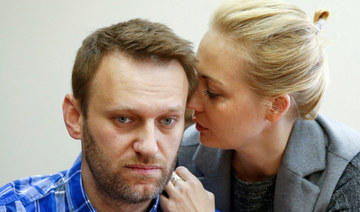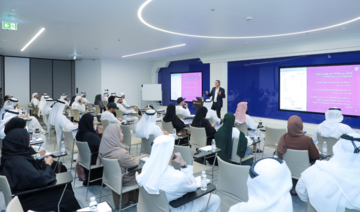MUMBAI: Eleven members of a family were found dead in India’s capital on Sunday, most of them hanging from the ceiling of their home, blindfolded and hands tied behind the back, in a part of the city that was the scene of a gang war just two weeks ago.
The victims included four men and seven women, including teenagers. A neighbor in the Burari district found the victims early on Sunday, police said.
One of the bodies was found lying on the floor and the others hanging from a railing attached to the ceiling, media reports said.
“We don’t know the reason yet, our team is at the spot and investigating this,” said a police official posted in the area, who did not give further details. The official cannot be identified under briefing rules.
On June 18, three people were killed and five were injured when members of rival gangs fired at each other in the main Burari market. Police said the two gangs are headed by men whose enmity goes back to 2013.
While police are yet to establish any connection between the two incidents, the investigation will consider all possible aspects, a senior police officer who is handling the gang war case told Reuters.
Eleven people killed in India’s capital, police probe link to gang war
Eleven people killed in India’s capital, police probe link to gang war
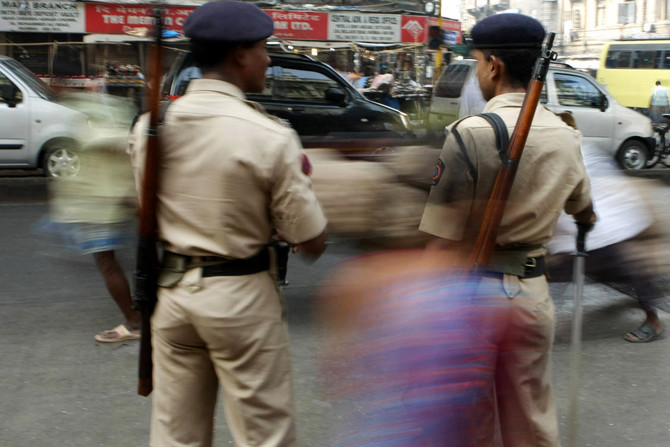
Pakistan expecting investment in port infrastructure by global shipping giant Maersk — minister
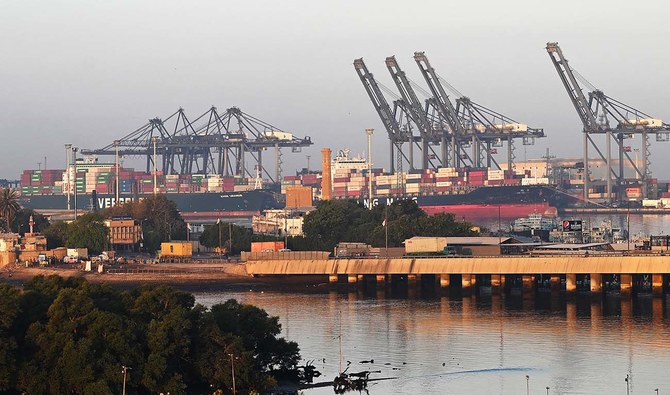
- AP Moller-Maersk has a market share of around 20 percent in Pakistan’s containerized import-export activities
- Qaiser Ahmed Sheikh says there is a lot of interest in Pakistan’s port as a global hub for transshipment
KARACHI: Pakistan is expecting investment from a Denmark-based global shipping giant, AP Moller–Maersk (Maersk), in its port terminal and infrastructure, the Pakistani maritime affairs minister said on Tuesday, amid growing global interest in Pakistani ports.
The statement comes more than a week after Maersk Chief Executive Officer Keith Svendsen’s visit to Pakistan, where he met top officials to explore opportunities in Pakistan’s maritime sector.
Maritime Affairs Minister Qaiser Ahmed Sheikh told Arab News the Danish shipping firm was interested in investing in a terminal and port as well as allied infrastructure, including connecting bridges.
“We had very good discussions with them and they had shown eagerness and told us that they will submit proposal in a few days,” he said. “They want to take a terminal. There is some area where there is depth in the sea, where big ships can be anchored.”
Maersk has grown into a leading provider of logistics and supply-chain services across Pakistan. It has around 20 percent market share in Pakistan’s containerized import-export activities, according to Pakistan’s information ministry.
In January, the Danish shipping firm announced new smart logistics and warehouse facilities in China, Norway and Pakistan.
“With a vast network of warehousing and depot facilities across the country, including our flagship logistics hub in Port Qasim, Karachi — a sprawling 27-acre complex encompassing over 650,000 square feet of warehouse space — we ensure unparalleled support to Pakistani exporters and importers,” the shipping company said in a written response to Arab News.
“In total, Maersk now operates over a 1.5 million square feet footprint across 7 cities in Pakistan.”
Sheikh said many companies were interested in investing in the Karachi Port Trust (KPT) despite a limited space available there.
“We have limited space available in KPT and many, including foreign, companies are taking interest in it, particularly in the deep-water areas where water depth is high and we have the location,” he said.
“The point is that there is a lot of interest in Pakistan’s port right now because they are seeing this as a global hub for transshipment and they will also run the feeder vessels in the Gulf from here.”
To a question about a visiting Saudi delegation, the maritime affairs minister said “there are many breakthroughs” during the visit. “They are looking for areas of mutual interest which both sides can benefit from,” he added.
The South Asian nation has already signed an agreement with Abu Dhabi (AD) Ports Group which is investing about $395 million for the development of a container and cargo terminal under a government-to-government (G2G) agreement between the United Arab Emirates and Pakistan.
Putin starts new six-year term with challenge to the West
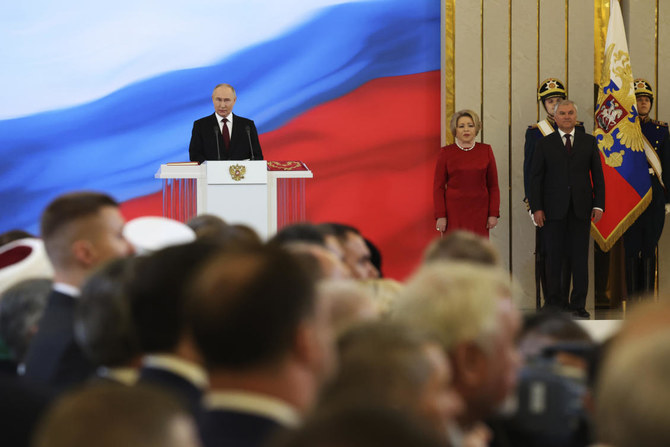
- Putin is sworn in for fifth term
- US and many EU states stay away
- Putin says he’s not ending dialogue with West
MOSCOW: Russian President Vladimir Putin said it was up the West to choose between confrontation and cooperation as he was sworn in for a new six-year term on Tuesday at a Kremlin ceremony that was boycotted by the United States and many of its allies.
More than two years into the war in Ukraine, Putin said he wanted to “bow” before Russia’s soldiers there and declared in his inauguration speech that his landslide re-election in March was proof the country was united and on the right track.
“You, citizens of Russia, have confirmed the correctness of the country’s course. This is of great importance right now, when we are faced with serious challenges,” he told dignitaries in a gilded Kremlin hall where a trumpet fanfare sounded to greet his arrival.
“I see in this a deep understanding of our common historical goals, a determination to adamantly defend our choice, our values, freedom and the national interests of Russia.”
At 71, Putin dominates the domestic political landscape. Leading opposition figures are in prison or exile, and his best known critic, Alexei Navalny, died suddenly in an Arctic penal colony in February.
Yulia Navalnaya, the late dissident’s wife, urged supporters in a video on Tuesday to keep up the struggle against Putin. “With each of his terms, everything only gets worse, and its’ frightening to imagine what else will happen while Putin remains in power,” she said.
On the international stage, Putin is locked in a confrontation with Western countries he accuses of using Ukraine as a vehicle to try to defeat and dismember Russia.
Putin told Russia’s political elite after being sworn in that he was not rejecting dialogue with the West, including on nuclear weapons.
“The choice is theirs: do they intend to continue trying to restrain the development of Russia, continue the policy of aggression, incessant pressure on our country for years, or look for a path to cooperation and peace?” he said.
With Russia’s troops advancing gradually in eastern Ukraine, the top US intelligence official said last week that Putin appeared to see domestic and international developments trending in his favor and the conflict was unlikely to end anytime soon.
It remains unclear how far Putin will seek to press the war and on what terms he might discuss ending it — decisions that will depend in part on whether Joe Biden or Donald Trump wins the US presidential election in November. Ukraine says peace can only come with a full withdrawal of Russia’s troops, who control nearly 20 percent of its territory.
Western absentees
Putin, in power as president or prime minister since 1999, will surpass Soviet leader Josef Stalin and become Russia’s longest-serving ruler since 18th century Empress Catherine the Great if he completes a new six-year term. He would then be eligible to seek re-election again.
He won victory by a record margin in a tightly controlled election from which two anti-war candidates were barred on technical grounds. The opposition called it a sham.
The United States, which said it did not consider his re-election free and fair, stayed away from Tuesday’s ceremony.
Britain, Canada and most EU nations also decided to boycott the swearing-in, but France said it would send its ambassador.
Ukraine said the event sought to create “the illusion of legality for the nearly lifelong stay in power of a person who has turned the Russian Federation into an aggressor state and the ruling regime into a dictatorship.”
Sergei Chemezov, a Putin ally, told Reuters before the ceremony, that Putin brought stability, something which even his critics should welcome.
“For Russia, this is the continuation of our path, this is stability – you can ask any citizen on the street,” he said.
Nuclear tensions
Russia’s relations with the United States and its allies are at their lowest point since the Cuban Missile Crisis of 1962, when the world came to the brink of nuclear war.
The West has provided Ukraine with artillery, tanks and long-range missiles, but NATO troops have not joined the conflict directly, something that both Putin and Biden have warned could lead to World War Three.
Underscoring the rise in nuclear tensions, Russia said on Monday it would practice the deployment of tactical nuclear weapons as part of a military exercise, after what it said were threats from France, Britain and the United States.
One of the decisions awaiting Putin in his new term will be whether to seek to renew or replace the last remaining treaty that limits Russian and US strategic nuclear warheads. The New START agreement is due to expire in 2026.
In line with the constitution, the government resigned at the start of the new presidential term. Putin ordered it to remain in office while he appoints a new one which is expected to include many of the same faces.
Clean energy tech investments fueling global economic growth: IEA
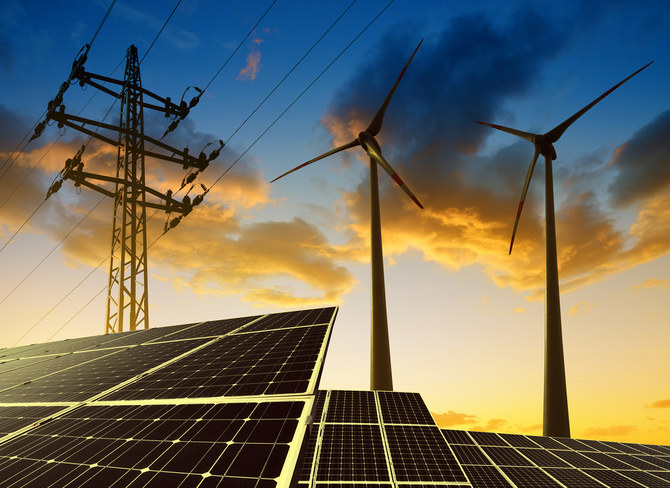
RIYADH: Booming investments in clean energy technology are strengthening the global economy by creating new industrial and employment opportunities, a report has outlined.
According to the International Energy Agency, global investment in the manufacturing of five key clean energy technologies – solar photovoltaic, wind, batteries, electrolyzers, and heat pumps – surged by 70 percent year-on-year in 2023 to $200 billion.
The IEA added that investments in clean technology manufacturing are becoming increasingly significant and are beginning to register in broader macroeconomic data.
According to the report, such investments in 2023 accounted for around 0.7 percent of worldwide investment across all sectors of the economy.
“In growth terms, the contribution is even starker — in 2023, clean technology manufacturing alone accounted for around 4 percent of global GDP (gross domestic product) growth and nearly 10 percent of global investment growth,” said the IEA.
Solar PV meets 2030 targets
The analysis revealed that investments in solar PV manufacturing more than doubled last year to $80 billion, while funding in battery production rose by around 60 percent to $100 billion.
Due to the surge in investments, solar PV module manufacturing capacity today is already in line with what is needed in 2030 based on the IEA’s net zero emissions scenario.
Similarly, for battery cells, if announced projects are included, manufacturing capacity is 90 percent of the way toward meeting net zero demand by the end of this decade, the report highlighted.
“Record output from solar PV and battery plants is propelling clean energy transitions — and the strong investment pipeline in new facilities and factory expansions is set to add further momentum in the years ahead,” said IEA Executive Director Fatih Birol.
He added: ‘While greater investment is still needed for some technologies — and clean energy manufacturing could be spread more widely around the globe — the direction of travel is clear.
“Policymakers have a huge opportunity to design industrial strategies with clean energy transitions at their core.”
The IEA also stated that around 40 percent of investments in clean energy manufacturing in 2023 were in facilities that are due to come online in 2024. For batteries, this share rises to 70 percent.
Battery manufacturing grows
Battery manufacturing also had a record year in 2023, with production totaling more than 800 gigawatt-hours, representing a rise of 45 percent from 2022.
The report highlighted that battery capacity additions also surged, with almost 780 GWh of cell manufacturing capacity added in 2023, around a quarter more than the previous year.
“Globally, battery manufacturing capacity could exceed 9 terawatt-hours by 2030 if all announcements are realized. Battery manufacturing deployment needs in 2030,” added the IEA report.
Similarly, new manufacturing capacity for wind and electrolyzers also grew faster in 2023.
According to the agency, the existing capacity for wind could deliver nearly 50 percent of the needs in 2030, while announced projects could meet a further 12 percent.
Meanwhile, capacity additions for heat pump manufacturing slowed due to stagnation in the majority of leading markets. The report added that the existing capacity could deliver only around one-third of the needs required in 2030.
China dominates clean energy
Clean energy manufacturing is still dominated by a few regions, with China home to 80 percent of the global solar PV module production capacity.
The report highlighted that the manufacturing of battery cells could become less geographically concentrated by the end of this decade if all announced projects are materialized.
After conducting plant-level assessments of more than 750 facilities, the IEA found that China remains the lowest-cost producer of all clean energy technologies.
“Battery, wind and solar PV manufacturing facilities are typically 20 percent to 30 percent more expensive to build in India than in China, and 70 percent to 130 percent more in the US and Europe,” the IEA said.
It added: “However, the vast majority of total production costs for these technologies; 70 percent to 98 percent, is estimated to come from operational costs, which include inputs such as energy, labor and materials — implying that production cost gaps seen today are not immutable and can be influenced by policy.”
Apart from China, the US, and the EU, other countries that heavily invested in clean energy technologies in recent years were India, Japan, and South Korea.
The report also highlighted that similar investments in Africa, Central America, and South America were negligible.
Multiple factors shape investments
The IEA revealed that cost is not the only factor that draws investments in the clean energy technology sector.
According to the think tank, several other factors, including the size of the domestic market, availability of skilled workers, and infrastructure readiness, are other crucial elements that shape the decisions of firms to invest in the sector.
“Policy interventions can therefore raise the attractiveness of investing in a given region without directly subsidizing the costs of manufacturing,” said the IEA.
It added: “Training and certification schemes for workers, compressing project lead times while maintaining environmental standards, enlarging domestic markets and reducing uncertainty with robust, stable climate policies are some key ‘low regret’ measures that can increase incentives to invest, irrespective of the role of direct incentives in industrial strategies.”
The report also underscored the vitality of research and development to increase the growth of clean energy manufacturing globally.
“While private-sector R&D can be stimulated by policies that promote manufacturing investment and experience, direct innovation support is also needed,” said the IEA.
The agency also noted that government initiatives, including R&D grants or loans, project finance, support for rapid prototyping, and promoting startups, will accelerate advancements in clean energy manufacturing.
Dubai Financial Services Authority sees 40% surge in new license registrations, CEO reveals
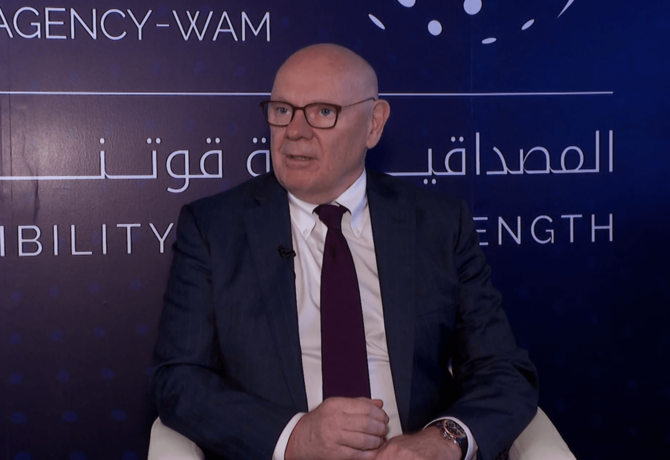
RIYADH: New license registrations through the Dubai Financial Services Authority increased by 40 percent in the first months of this year compared to the same period in 2023.
The organization’s CEO, Ian Johnston, confirmed the issuance growth to the Emirates News Agency on the sidelines of the 2nd edition of the Dubai Financial Technology Summit.
Johnston stated that 2024 is poised to be the most dynamic year yet for new license issuances, building on the momentum achieved in the past two years.
He added that this period will witness an abundance of new licensing activities, encompassing startups in the financial technology sector, as well as major corporations and international banks continuing to converge toward the Dubai International Financial Centre.
DIFC, a hub in the Middle East, Africa, and South Asia region, connects the area’s fast-growing markets with global economies and offers dining, retail, and living amenities, according to its website.
The CEO anticipated receiving over 100 applications from companies, with between 130 and 140 new businesses slated for licensing in the DIFC, reflecting the pace of growth, according to WAM.
He emphasized that the base serves as the primary international financial destination in the region, contributing to Dubai’s strategy to enhance its position as a global financial center in the Middle East.
He stated: “We are not only witnessing an increase in the number of companies we license, but also witnessing the success of these companies in the DIFC, facilitating individuals in conducting their business, as well as facilitating the conclusion of deals.”
Johnston emphasized Nasdaq’s role in Dubai’s global bond and sukuk listing hub, noting it as the world’s largest sustainable sukuk market, with over 60 percent in US dollars tied to environmental, social, and governance criteria, and around 50 percent across all currencies linked to governance and social responsibility.
He noted that Nasdaq Dubai has become the leading venue for listing environmental, social, and governance sukuk, demonstrating the increasing interest in sustainable investments and Nasdaq Dubai’s position as a preferred platform for such issuances.
Johnston anticipated that the DIFC would continue to experience further growth and activity in the current year, owing to Dubai’s established status as a regional financial center, highlighting that the center accommodates over 40,000 professionals, in addition to those working in finance outside the center.
The CEO indicated that Dubai is poised to emerge as one of the top four to five global financial centers in the coming years, stating: “We are already working toward achieving that as soon as possible.”
He stressed the Dubai Financial Services Authority’s goal to promote innovation by backing the fintech sector within regulations. This aligns with companies’ move toward regulatory compliance and proactive adoption of guidelines for stability and sustainable growth.
The authority had announced earlier in January that it had an exceptional growth year in 2023, saying in a press release: “The region’s leading regulator licensed and registered a record-breaking 117 firms during the 12-month period, an increase of 25 percent from the previous year.”
Johnston explained that regarding rules and governance, one of the positive developments occurring now is that financial technology operators are beginning to understand the regulatory process, and the task as regulators is to ensure that they impose directives to protect investors.
DIFC had recorded its highest gross written premiums in its 20-year history, amounting to $2.6 billion in 2023, marking a 23 percent increase from the previous year.
The center also recorded a 20 percent rise in the registration of insurance and reinsurance firms, including the first move of a Guernsey-based captive.
FBI’s fallen Pakistani agent Kamran Faridi says returning to Pakistan will be ‘dangerous’
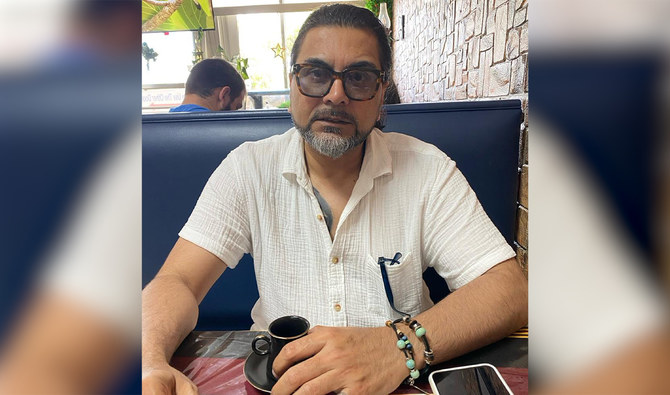
- Faridi was recently released from a Florida prison on the condition he would deport himself to Pakistan permanently
- Faridi ran off to Sweden and then to the US in the 1990s after falling out with the law over his links with criminal gangs
KARACHI: Kamran Faridi, a fallen undercover FBI agent from Karachi who was recently released from a Florida prison on the condition he would surrender his American nationality and deport himself to Pakistan permanently, said on Tuesday it would be “dangerous” for him to return to his home country from where he had escaped a life of crime nearly 30 years ago.
Faridi, 60, worked as an informant and agent for the FBI for nearly 15 years and was the architect of the plan to entrap Karachi businessman Jabir Motiwala, arrested by Scotland Yard in London in 2018 on the request of the United States. After years working for the FBI, he was sentenced to 84 months in jail on Dec. 9, 2022, after he refused to testify against Motiwala.
“It will compromise my well-being, it’s going to be difficult,” Faridi told Arab News in a phone interview from Florida, speaking about the prospect of returning to Karachi after nearly 30 years. “It’s going to be dangerous but what choices do I have?”
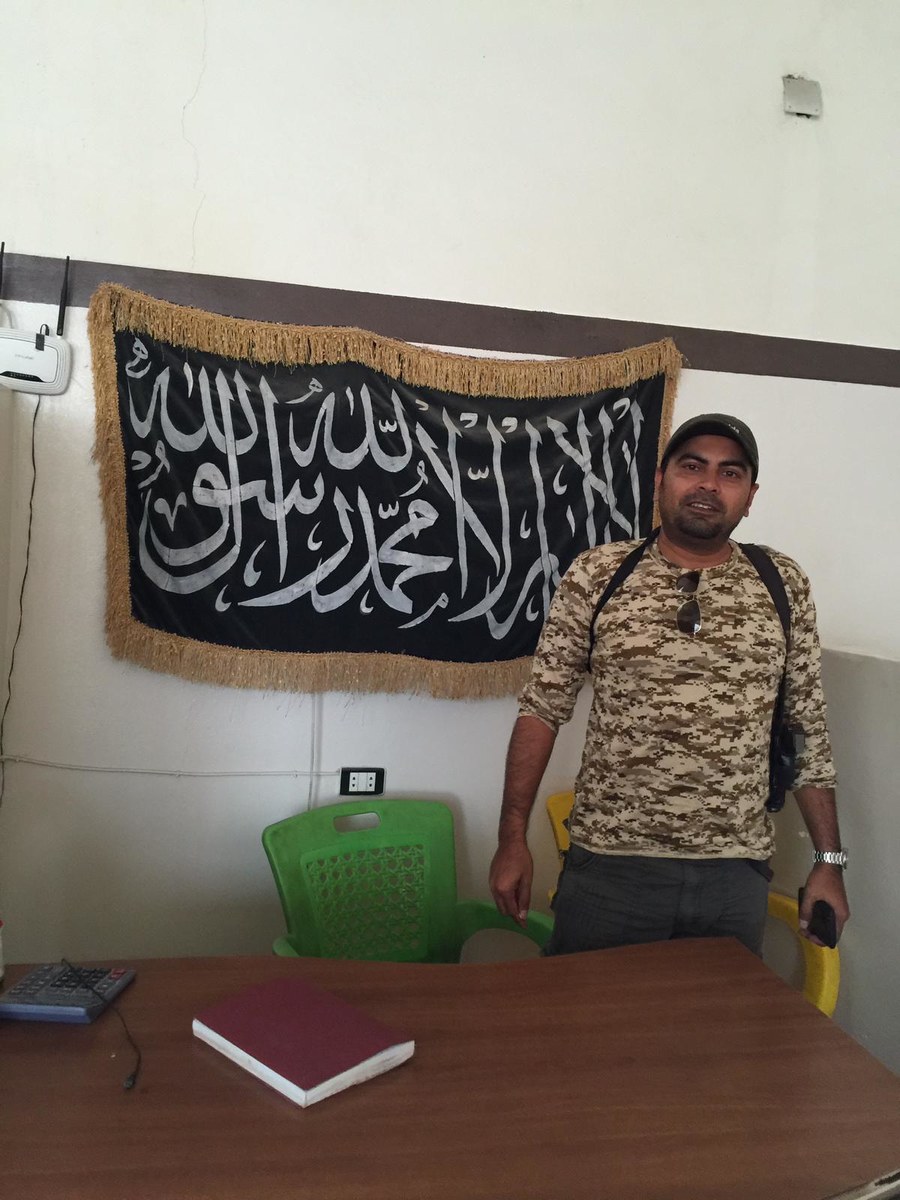
Faridi, who lives in the US with his American wife, said the judge had reduced one year from his prison sentence on account of a recent law where a first offender gets a two-point sentence reduction.
Good conduct in prison and a verbal agreement with American authorities that he would surrender his nationality and return to Pakistan before August this year further reduced his sentence, Faridi said. Another stipulation of the agreement was that he would not appeal the court’s decision.
VETERAN SPY
Faridi worked for the FBI from 1995 till 2020 and helped the American agency nab several targets associated with transnational terrorist organizations. However, a 25-year relationship with the American agency turned sour in 2020 after Faridi said he refused to testify against Motiwala, allegedly a high-ranking member of the Indian organized crime syndicate D-Company.
Motiwala was arrested in London in August 2018 for conspiring to launder money into the United States and using force to extort funds. Faridi, who played a pivotal role in his arrest, said he later refused to testify against Motiwala after he realized the businessperson had been framed on bogus charges.
Faridi said his FBI colleagues had informed him that FBI was involved in a joint operation with India’s spy agency the Research and Analysis Wing (RAW) to establish a link between Motiwala, the D-Company and Pakistan’s Inter-Services Intelligence (ISI) military spy agency.
Faridi was arrested in London in 2020 after FBI agents intercepted his conversations with Motiwala’s lawyers, revealing his intent to testify in Motiwala’s favor. He was apprehended at the London Heathrow Airport while attempting to enter the UK, intending to testify against the FBI’s actions regarding Motiwala.
Charged with being a threat to his former FBI colleagues, Faridi was swiftly extradited back to the US and jailed.
“It’s a very complex case, the FBI wants to punish me for not testifying against D-Company,” Faridi said.
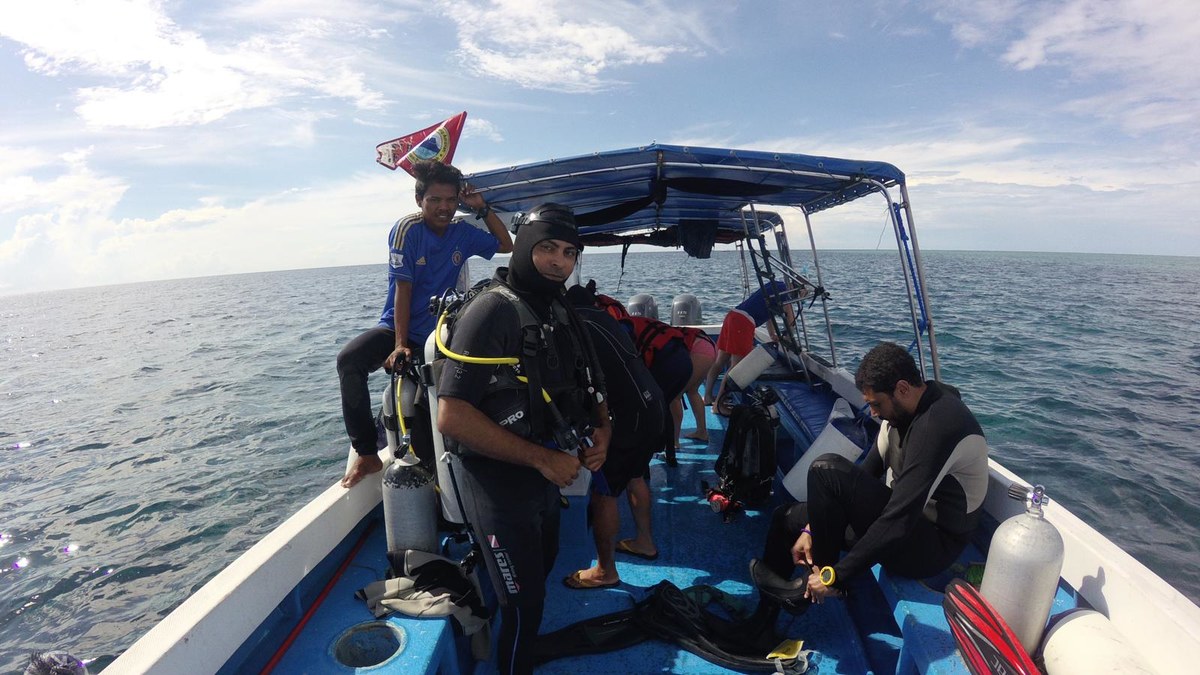
FROM KARACHI TO ATLANTA
Faridi was a member of the Karachi-based Muttahida Qaumi Movement (MQM) party and subsequently of its rival, the Peoples Student Federation (PSF), in the 1990s. Both groups were widely known to be involved in criminal activities like kidnappings and armed robberies, which Faridi also became linked to. He later went on the run and escaped to Sweden, where he sought asylum almost three decades ago. He was later arrested by authorities after getting into fights with local gangs there, but broke out of prison and managed to escape to the US, where he ran a gas station in Atlanta.
It was there that he came into contact with the Atlanta Police Department after he complained to them about “corrupt” police officers whom Farid said were harassing him. Thus began his work as an informant with Atlanta police, who later introduced him to the FBI. Impressed with his proficiency in the Urdu, Punjabi, Hindi, and Spanish languages, the FBI decided to recruit him as an informant and agent.
“So that’s how I got introduced to FBI and they introduced me to the Drug Enforcement Authority, Immigration and Customs Enforcement, and after 9/11 the Central Intelligence Agency, MI6, French intelligence and many others,” Faridi said.
Faridi said he had paid a “hefty” price for refusing to testify against Motiwala but would now return to Karachi with his wife.
“I was a gangster but I am neither a criminal nor a gangster now,” he said. “I am returning to my city as a normal man.”


